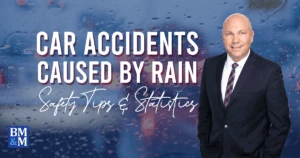
When driving in Central Florida dealing with wet road conditions in inevitable. Rain can cause your car to slide, drive uncontrollably, and cause you to have poor vision, especially at night. The rain actually causes more accidents than snow. This is due to the fact that people tend to drive more safely in snow than rain. In reality, rain is just as challenging to drive in then snow and can cause just a serious of an accident. There needs to be an awareness of driving in the rain like there is when people drive in the snow. Your vision is just as bad. It’s just as difficult to drive and just as lousy of a weather event. All of these factors are the main reasons why there needs to be more awareness surrounding the impact rain has on car accidents.
Statistics on Rain-Related Car Accidents
If the general public knew more about the statistics surrounding rain-related car accidents, then surely there would be a larger awareness surrounding it. Below are some statistics about rain-related accidents:
- As noted before, rain causes more accidents than snow.
- The National Highway Traffic Safety Administration (NHTSA) states that wet pavement causes 70% of weather-related car accidents, and rain causes 46% of weather-related car accidents.
- On average, more than 6,000 people are killed, and 445,000 people are injured due to weather-related accidents.
- 10% of all car accidents are caused by rain.
To consult with an experienced car accidents lawyer today
855-780-9986
Solutions for Driving While it’s Raining
As you can tell, there are a ton of reasons why it’s important to be more knowledgeable about rain-related car accidents. The more knowledgeable someone is on something, the more likely they’re going to be smarter about the situation. Meaning if every person knew about these deadly statistics, they’d think twice about speeding through a rainstorm at night. Below are some solutions for driving while it’s raining:
Make Sure Your Car is in Good Condition
Always make sure your car is properly serviced and maintained for all weather conditions. Before driving the car for the first time each day, take a few minutes to check your tire treads, headlights, taillights, and turn signals. For example, replace windshield wipers as needed to ensure good visibility. Tires need to have the proper tread are working to their best ability. For driving in Florida, look for tires rated high for hot and humid weather. Repair or replace any worn or malfunctioning items promptly.
Drive at an Appropriate Speed
It is essential to travel at a speed appropriate to the weather conditions, not necessarily just within the speed limit. The posted speed is the maximum speed for driving under perfect conditions. It may be too fast to drive safely in wet or rainy conditions. Therefore, plan ahead and allow more time to get to work on a rainy morning. Do not use cruise control, as you may lose control of your car. Also, be careful to leave extra space between cars. Leave at least five seconds of following distance between you and the car in front. Avoid hard braking and sudden movements as much as possible. When driving in wet weather, the driver must be fully engaged.
Know How to Handle a Skid
If your car skids or hydroplanes, don’t panic. If your car starts to skid, continue to steer in the direction you want to go. Slamming on the brakes makes it harder to control your car. Hydroplaning means that the tires will ride up on top of the water like a pair of water skis and lose all contact with the road. If this happens, calmly and slowly take your foot off the accelerator. Then carefully turn the steering wheel in the direction your car is moving while hydroplaning and wait for the tires to reconnect with the road’s surface.
Ensure Maximum Visibility
Be sure to turn on your headlights. If your windshield wipers are on, then your lights should be on. Your headlights will help you see better during the rain. They will also make it easier for others to see you. If your windshield is fogging up, turn on your front and rear defrosters to improve visibility. Florida’s law requires the use of headlights when it is raining. In addition, as of July 2021, drivers who are on the road during a major downpour can use their hazard lights under certain conditions.
Conclusion
With regard to rain-related accidents, it’s best to be smart about the situation. Don’t be a reckless and aggressive driver in the rain. Always be overly cautious with this sort of thing because you never know what might end up happening.
If you’ve been in an auto accident due to someone’s reckless driving in the rain, you may be entitled to compensation. Our firm represents Orlando car accident victims in personal injury cases. We may be able to investigate your case and pursue the liable party for compensation on your behalf while you concentrate on recovering from your injuries. Call Bogin, Munns & Munns today for a free, no-obligation consultation with a member of our team.
Call or Submit Our Consultation Request Form Today





